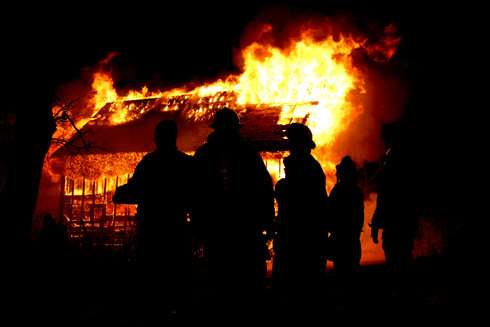Electrical hazards are one of the leading known causes of barn fires
By Jennifer Jackson
A number of barn fires have been reported over these past few winter months. Recently, Farms.com connected with Dan Carlow, manager of innovation, engineering and program delivery for the Ontario Ministry of Agriculture, Food and Rural Affairs, to learn more about on-farm fire risks.
The first most significant step to minimizing the risk of fires? Monitor the farm’s electrical systems, says Carlow.
“The main cause (of fires) that we have seen over the years traces back to electrical (systems)” says Carlow. “This could mean everything from equipment to wiring to electrical panels. During the winter months (especially, as) barns are under increased electrical stress … this has led to more barn fires that we would like to see.”
Of the barn fires that have occurred, older buildings are affected more often than newly-constructed buildings, according to Carlow. This is because most new barns are designed with more safety features to handle increased electrical stress.
Regardless of the barn’s age, however, Carlow recommends that all farmers maintain strong relationships with their licensed electricians and have them inspect every electricity-supplied building on the property annually.

“Having that annual electrical inspection is number one (in terms of preparedness). Farmers should be working directly with their electricians – have them into the barn, going through all of the outlets, the plugs (and) the electrical panel,” says Carlow. “They can test for any excess heat. Any hot areas should be examined closely to figure out what is causing the heat.”
In addition to having electricians inspect the barn, farmers should be executing housekeeping and preventative maintenance on a regular basis. This means cleaning up any excess flammable material, using proper electrical cords, and inspecting the use and connections of equipment like space heaters – to name a few examples.
Even with proper inspection and maintenance of the property, all farmers should have an emergency plan that accounts for all those involved with the farm. These plans should include every farm building and the floor plans of those buildings, as well as emergency contact numbers.
“The plan should be up to date – every farmer could benefit from reviewing it on a more regular basis,” he says. “We recommend (farmers and workers) look at it monthly - things change on a farm on a regular basis.
“Post (the plan) in a prominent location so everyone can review it. Develop the plan, revisit it regularly, and train family and workers on what’s on the plan.”
For extra caution, “famers can have the fire department visit the farm in advance – some do this free of charge – to go through the floor plan, the sources of heat, the electrical system and where any water is (located) … this (information) can save (firefighters) time” should they have to return in the case of a fire, according to Carlow.
“Farm fires are so tragic. The winter certainly adds (electrical) stress,” says Carlow. “We strongly encourage farmers to be very active in managing the risk: having the electrical contractor on site, taking care of housekeeping, and updating and practicing the emergency plan as much as possible.”
More information on electrical hazards can be found in OMAFRA’s factsheet, Electrical Systems in Barns.